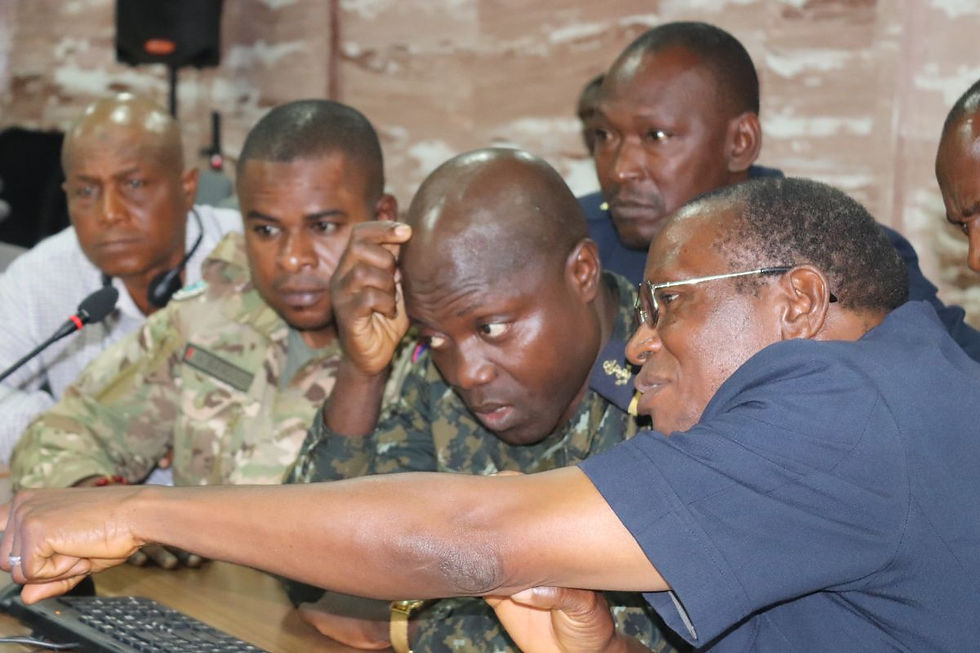Inter-agency and FMC training workshops in Guinea
- Oct 13, 2022
- 3 min read
Updated: Oct 21, 2022
In the latter half of September 2022, the Guinea Ministry of fisheries and Maritime Economy organized two workshops in Conakry, Guinea.

The first was dedicated to strengthening inter-agency cooperation in the fight against IUU fishing (20-22 September 2022), and the second was a training course focused on fisheries monitoring and surveillance (27-30 September 2022).
Both workshops were facilitated by TMT under the Oceans 5-funded ‘Strengthening of Fisheries Governance in Guinea’ project and organized in collaboration with project partners PRCM (Regional Partnership for Coastal and Marine Conservation in West Africa) and GRID Arendal.
Inter-agency workshop
The workshop enabled agency representatives to gather and discuss how to cooperate to deter IUU fishing.
Participants included representatives from:
- Direction Nationale des Pêches Maritimes (DNPM)
- Centre National de Surveillance et de Police des Pêches (CNSP)
- Préfecture Maritime
- Gendarmerie Maritime et Fluviale
- Direction National de l’Aménagement des Pêcheries (DNAP)
- Agence de la Navigation Maritime (ANAM)
- Office National de Contrôle Sanitaire des produits de la Pêche et de l'Aquaculture (ONSPA)
- Centre National des Sciences Halieutiques de Boussoura (CNSHB)

The aim of this workshop was to establish a clear picture of the current state of national inter-agency cooperation. All participants gave presentations regarding their respective agencies’ roles and responsibilities regarding counter IUU fishing activities.
The workshop also highlighted areas in which inter-agency cooperation should be focused and strengthened, such as: registering and licensing fishing vessels; implementation of the FAO Port State Measures Agreement (PSMA); and the conduct of joint maritime patrols. The development of Guinea’s new legal framework for fisheries was discussed as well as the transposition of PSMA into national law. TMT delivered presentations and guidance on licensing due diligence, risk assessment methods and the utility of analytical tools such as the ’PSMA Port Profiles’.
Participants had the opportunity to share their needs in capacity building and training to actively and efficiently deter IUU fishing.

Through the workshop, agency representatives agreed to create a ‘permanent contact group’ as a platform for inter-agency cooperation. This contact group, dedicated to counter IUU fishing, would be placed under the authority of the Préfecture Maritime. TMT, under the ‘Strengthening of Fisheries Governance in Guinea’ project, will support the establishment of the contact group, including through the setting up of an online secure communication platform between contact persons in relevant agencies.
The workshop also allowed TMT and project partners to plan for upcoming activities such as a test drone deployment in support to fisheries patrols and the introduction of the Vessel Viewer mobile application, developed in cooperation with Global Fishing Watch, to support risk assessments as part of port entry request and license applications.

Fisheries Monitoring Centre training
This workshop, held at the recently refurbished and reequipped fisheries monitoring centre (Centre National de Surveillance des Pêches - CNSP), was an opportunity for operators to receive training on fisheries surveillance and monitoring systems. For this training, TMT had gathered a team of analysts and consultants as well as trainers from its technology partners of the JAC (Joint Analytical Cell): Global Fishing Watch and Skylight.
The workshop was mainly targeted at fisheries agents and operators from the CNSP, but also included inter-agency representatives from the national fisheries Directorate (Direction Nationale des Pêches Maritimes - DNPM), the Préfecture Maritime and the Maritime and river police.
The aim of this training was to provide operators with theorical, and practical knowledge of tools used for fisheries surveillance and monitoring. Crucially, it was aimed at training new recruits on the use of Guinea’s current Vessel Monitoring System (VMS) – CLS Themis – as well as introducing new tools provided by Global Fishing Watch and Skylight.

The training allowed FMC personnel to better understand the tracking systems used onboard by fishing vessels (AIS and VMS), the data those systems generate, and the respective strengths and weaknesses of the platforms exploiting this data. A better understanding of these systems will not only enable operators to have a better use of maritime surveillance tools but also to identify fishing vessels’ unusual behavior.
Each monitoring platform using VMS and AIS data was then introduced through theorical, and practical sessions. Operators were given the opportunity to log into each platform and perform guided tasks as part of scenarios (patrol operation, suspicious behavior detection, etc.) developed by the joint team of trainers. Crucially, this workshop highlighted the importance of using several platforms in combination to enhance maritime domain awareness and foster the analytical capabilities of FMC operators.




